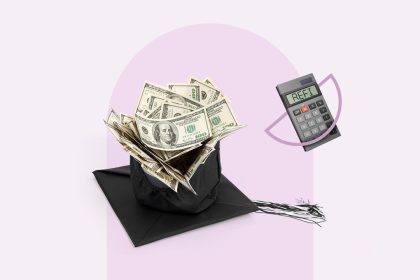rbazon/GettyImages; Illustration by Hunter Newton/Bankrate
Key takeaways
- Debt consolidation loans combine two or more separate debts into a single loan with a single monthly payment.
- Some debt consolidation loans are secured, whereas others are unsecured.
- Because secured loans require collateral, unsecured debt consolidation loans are less risky to borrowers.
- A secured loan could still be better if you have subpar credit.
While it can be challenging to manage multiple debt accounts at once, you may find some relief with a debt consolidation loan. These loans are readily available through traditional banks, credit unions and online lenders. They also come in two forms: secured and unsecured loans.
Secured and unsecured debt consolidation loans can help you shave several months or even years off your repayment period. You could also save a bundle of interest by getting a debt consolidation loan with a more competitive interest rate.
Secured vs. unsecured debt: What’s the difference?
Unsecured debt is not secured by any type of collateral. An example is an unsecured personal loan that results in a lump sum payment to the borrower in exchange for a promise of repayment of the loan, including applicable interest and fees.
Secured debts are secured by collateral, which could include a home, the title of a car, money in a bank account or other assets. With secured debt, the lender has the right to seize the collateral if the borrower fails to repay.
What is a debt consolidation loan?
A debt consolidation loan is a personal loan or other credit product used to roll several debt balances into one new loan product. Depending on which debt consolidation option you choose, your loan might be secured with collateral or unsecured.
You can use a personal loan calculator and credit card payoff calculator to compute potential interest savings with a debt consolidation loan. Ideally, the interest rate on a debt consolidation loan should be lower than what you currently have to maximize cost savings.
Secured debt consolidation loan
Pros
- Easier loan approval: When you qualify for a loan that requires collateral, it may be easier to be approved.
- Improved loan terms: Some loans with collateral come with lower interest rates, higher loan limits or both.
Cons
- Collateral required: You have to have collateral or assets to put down in order to qualify.
- Put collateral at risk: If you fail to repay the loan, the lender can seize the asset.
Unsecured debt consolidation loan
Pros
- No collateral required: Qualify based on your credit score and income without the need for collateral.
- No assets at risk: The lender won’t have any assets to seize if you fail to repay the loan.
Cons
- Stricter approval requirements: Without collateral, you may need a higher credit score, more income or both to qualify.
- Potential for higher loan costs: Because unsecured loans are riskier for lenders, costs for borrowers can be higher.
2 Types of secured debt consolidation loans
Despite their risk, debt consolidation for secured loans may be worthwhile, depending on your financial situation. You can use any of these secured loan products for debt consolidation.
3 Types of unsecured debt consolidation loans
For unsecured loans, lenders rely heavily on your credit profile, income and job history to make decisions.
How to get a debt consolidation loan
Take the following steps to secure a debt consolidation loan of your own:
- Assess your financial situation: Ideally, you should have a credit score in the mid-600s and a debt-to-income (DTI) ratio that doesn’t exceed 36 percent to have the best chance at qualifying for a loan with competitive terms.
- Compare loan options: You can apply for a debt consolidation loan through a traditional bank, credit union or online lender. Make sure to compare lenders based on their interest rates, origination fees, repayment terms and other factors.
- Check eligibility requirements: Be mindful that each lender has unique eligibility requirements. Research or contact a customer service rep before you apply, and choose a debt consolidation lender that serves customers like you.
- Apply when you’re ready: Once you find a lender with loan terms you can live with, take the steps to apply online. Some lenders even let you check your rate and gauge your approval odds without any impact to your credit score.
Bankrate’s take: A lower credit score won’t automatically result in a denial, but you can expect higher borrowing costs and less favorable loan terms.
Which debt consolidation loan is right for you?
The right option is whichever loan helps you get out of a debt with a monthly payment and all-in cost you can afford. A debt consolidation loan could be a viable way to get the funds you need.
You could opt for a secured debt consolidation loan like a home equity loan if you are a homeowner, but there are other secured loan options to choose from as well. If you’re not a homeowner, you could still potentially get an unsecured personal loan with less-than-perfect credit. You could even consolidate debt with a peer-to-peer loan or a balance transfer credit card.
Bottom line
A debt consolidation loan makes managing multiple debt accounts easier. You can pay off your balances faster and save on interest. Weigh your options between secured and unsecured loans before applying to get the right loan for your finances.
Read the full article here





